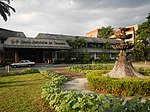University of the Philippines
The University of the Philippines (UP; Filipino: Pamantasan ng Pilipinas or Unibersidad ng Pilipinas) is a state university system in the Philippines. It is the country's national university, as mandated by Republic Act No. 9500 (UP Charter of 2008), giving it institutional autonomy.Originally founded by the American colonial government on June 18, 1908, it was established through the ratification of Act No. 1870 of the 1st Philippine Legislature to serve as an "advanced instruction in literature, philosophy, the sciences and arts, and to give professional and technical training" to eligible students regardless of "age, sex, nationality, religious belief and political affiliation."The University of the Philippines system has 8 constituent universities (CUs): UP Diliman, which serves as the system's flagship university, UP Los Baños, UP Manila, UP Visayas, UP Open University, UP Mindanao, UP Baguio, and UP Cebu which are scattered across 17 campuses.Widely regarded and often cited as the Philippines' top university system, its alumni include a Nobel Peace Prize laureate, 7 of 16 Philippine presidents, 14 of 26 chief justices, 36 of 42 national scientists, and 40 of 57 national artists, the most of any university. UP's alumni also include more senators as well as members of the Philippine House of Representatives than any other university. Among its alumni are also 15,000 doctors, 15,000 engineers, 8,000 lawyers, 23,000 teachers, and thousands of graduates in other academic fields, which comprise some of its approximate 260,000 living alumni worldwide. UP has the most National Centers of Excellence and Development among higher education institutions in the country, and is one of the only three schools in Asia that have received institutional recognition in the Ramon Magsaysay Awards. Senate Resolution No. 276 of the Senate of the Philippines recognizes the institution as "the nation's premier university"; UP ranks as the country's No. 1 university, among the top 100 Asian universities, and among the top 400 universities worldwide in annual university rankings.
Excerpt from the Wikipedia article University of the Philippines (License: CC BY-SA 3.0, Authors).University of the Philippines
Valerio Kalaw, Quezon City
Geographical coordinates (GPS) Address Nearby Places Show on map
Geographical coordinates (GPS)
| Latitude | Longitude |
|---|---|
| N 14.666666666667 ° | E 121.06666666667 ° |
Address
Valerio Kalaw
Valerio Kalaw
1128 Quezon City (6th District, Tierra Bella Homes)
Philippines
Open on Google Maps





